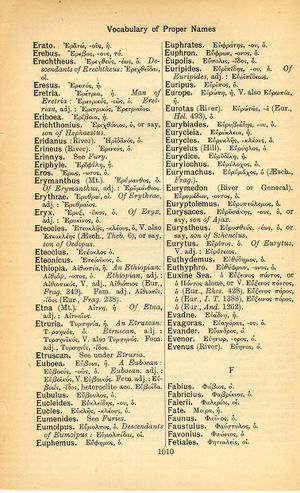Etruria
Ἡ γλῶσσα πολλῶν ἐστιν αἰτία κακῶν → Malis initium lingua permultis dedit → Die Zunge ist vielfachen Leides Ursache
English > Greek (Woodhouse)
Τυρσηνία, ἡ.
An Etruscan: Τυρσηνός, ὁ.
Etruscan, adj.: Τυρσηνικός, V. also Τυρσηνός. Fem. adj., Τυρσηνίς, -ίδος.
Latin > English (Lewis & Short)
Ē̆trūrĭa: (Het-), ae, f.,
I a country of central Italy, Mel. 2, 4, 2; Plin. 3, 5, 8, § 50; Cic. Div. 1, 41, 92; id. Cat. 2, 3 fin.; Varr. L. L. 5, § 32 Müll.; Liv. 1, 35, 9; Verg. A. 8, 494; 12, 232 et saep.—Deriv.,
II Ē̆truscus, a, um, adj., of Etruria, Etruscan: litus, Mel. 2, 7, 19; Hor. C. 1, 2, 14; id. C. Sec. 38; id. Epod. 16, 40: mare, id. C. 3, 29, 35: juga, Verg. A. 8, 480: duces, id. ib. 11, 598: manus Porsenae, Hor. Epod. 16, 4: disciplina, the Etruscan religion, Cic. Fam. 6, 6, 3; Plin. 2, 83, 85, § 199; 10, 15, 17, § 37; cf. haruspices, Gell. 4, 5, 5: litterae, Liv. 9, 36: coronae, made of gold and precious stones, and worn by those who triumphed, Plin. 21, 3, 4, § 6.—Sing., Plin. 33, 1, 4, § 11; Tert. de Coron. 13: aurum, a golden amulet worn by Roman boys of noble birth, Juv. 5, 164 et saep.—Subst.: Etrusci, ōrum, m., the Etruscans, Cic. Div. 1, 42; Liv. 1, 34; 2, 7 et saepiss.

